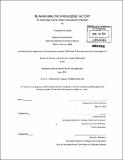| dc.contributor.advisor | Arindam Dutta. | en_US |
| dc.contributor.author | Issaias, Theodossios D. (Theodlossios Demetrios) | en_US |
| dc.contributor.other | Massachusetts Institute of Technology. Dept. of Architecture. | en_US |
| dc.date.accessioned | 2011-08-30T15:49:24Z | |
| dc.date.available | 2011-08-30T15:49:24Z | |
| dc.date.copyright | 2011 | en_US |
| dc.date.issued | 2011 | en_US |
| dc.identifier.uri | http://hdl.handle.net/1721.1/65550 | |
| dc.description | Thesis (S.M.)--Massachusetts Institute of Technology, Dept. of Architecture, 2011. | en_US |
| dc.description | Cataloged from PDF version of thesis. | en_US |
| dc.description | Includes bibliographical references (p. 103-108). | en_US |
| dc.description.abstract | Point of departure for this thesis is a concern regarding educational institutions' current state and the dialectic that it suggests with the city within which they reside. US universities and specifically MIT are used as case studies to depict the contemporary conditions that characterize research and education and their impact in their physical, economic and social context. Last, using as a test-field the city of Eleusina in Greece, this proposal aims to destruct the accumulated and concentrated value embedded in the knowledge economies of universities. The recent financial crisis in Greece has created conditions in which the state of emergency defines sovereignty itself. Nevertheless, by seeking to trade on values of authenticity, locality, culture opens space for political thought, and potentially actions within which alternatives can be both formulated and achieved. Universities as cultural institutions are taking part in this dynamic process. Educational institutions could provide the platform for redefining and negotiating the cultural commons. Operating in multiple geographies, universities are part of the global networks of knowledge. They are also significant nodes of the knowledge system and its global-local dialectic. The manifestation of these systems in urban space makes universities ideal places for this exploration. The restructuring of the Greek University, already an undergoing process, gives the opportunity to re-imagine education in its contemporary context. This project is sited in the city of Eleusina; one of the most devastated areas in the country both by the recent crisis and by its industrial past. On the other hand the city's unique superimposition of layers created through the centuries - evident in the urban fabric - in addition with the current uncertainty, are used as the pivot for the proposal of an alternative educational institution. | en_US |
| dc.description.statementofresponsibility | by Theodossios D Issaias. | en_US |
| dc.format.extent | 108 p. | en_US |
| dc.language.iso | eng | en_US |
| dc.publisher | Massachusetts Institute of Technology | en_US |
| dc.rights | M.I.T. theses are protected by
copyright. They may be viewed from this source for any purpose, but
reproduction or distribution in any format is prohibited without written
permission. See provided URL for inquiries about permission. | en_US |
| dc.rights.uri | http://dspace.mit.edu/handle/1721.1/7582 | en_US |
| dc.subject | Architecture. | en_US |
| dc.title | Re-imaging the knowledge factory : an alternative role for Attica's educational institution | en_US |
| dc.type | Thesis | en_US |
| dc.description.degree | S.M. | en_US |
| dc.contributor.department | Massachusetts Institute of Technology. Department of Architecture | |
| dc.identifier.oclc | 747037392 | en_US |
